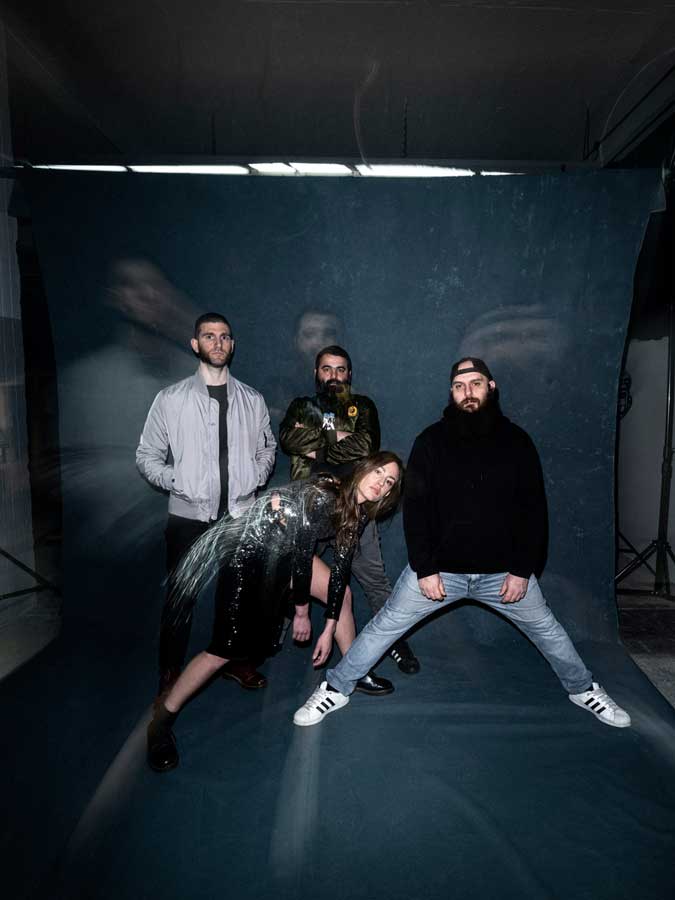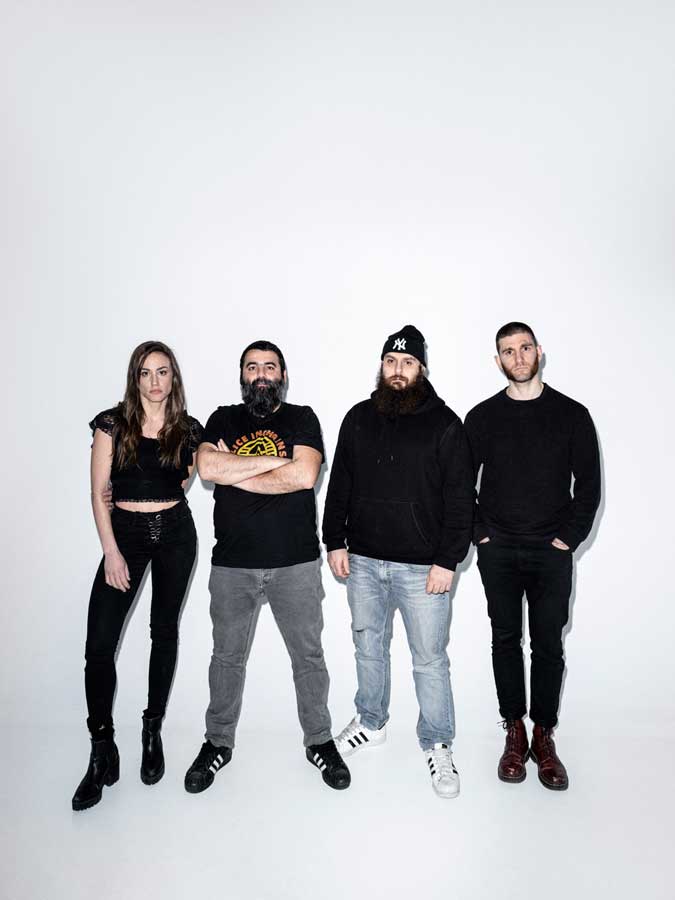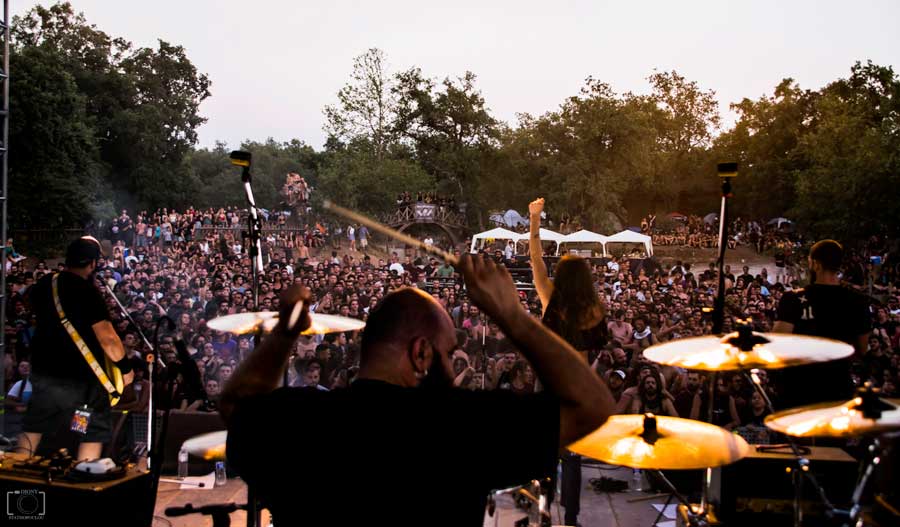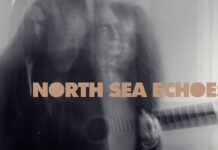
Puta Volcano, a rising force in the Greeκ rock scene, continue to pave the way with their latest album “AMMA”. We chat with them about their new album, their influences and inspiration, the rock scene’s place within Greek music, making a living out of music, and a whole lot more.. Interview: Michael Murphy Grammatopoulos

Rockpages.gr: Let’s start with AMMA, your new album. Once again, you’ve moved to a new direction, a more massive sound. Was that intentional? Did you think about where you wanted to go with this album?
Alex: I don’t think it was intentional. The production followed suit from the compositions. We didn’t start off to make something more brutal, or get a thicker sound – it simply happened. The production helped that, and led it to that direction.
Anna: I feel it happened organically, we didn’t plan it. We obviously didn’t sit down to make something heavier. And, as Alex said, our producer also contributed to the final result. It came naturally after Harmony of Spheres.
Rockpages.gr: What influence did your producer, Johnny Tercu, have?
Steve: The ideas came from us, and the heaviness of the sound had to do with our psychology at the time, and what we wanted to give to it. In this case, our producer simply fine-tuned it and filtered it. He’s not the guy with the lasso who will direct us to where he wants; that’s not what we would want either, plus he doesn’t work that way. We respect his process, so we simply asked him to add his own flourishes to what we had in our heads.
Bookies: At the same time, he could hear the songs’ progress and helped define some things that could move us forward. Meaning that he would push us to give out the best we could in terms of performance – you know, ‘work on this part a bit more’; and that made us persist more, and work harder on specific things. He plotted a course for us.
Anna: As far as vocals, he certainly helped me, being a singer himself. We found a common aesthetic.
Alex: One thing we all share, as a group, is our tastes seem to change in tandem. Collectively, we know what we don’t want first, rather than what we do want. When we pool together ideas for new songs, we quickly reject things that may sound good, but don’t work for us as a unit in that particular time. We don’t set goals, or think: we want specific time-signatures, lyrics, or styles; in the studio, we know which ideas are suitable for the new album. That’s how it comes together.

Rockpages.gr: You also made your first music video. Did you aim towards bigger promotion?
Bookies: We’ve wanted to make a music video for some time. We’d tried a couple things in the past, for the last 2 albums, but didn’t like their aesthetic, and abandoned them. But making the video this time round wasn’t a calculated move. We certainly have got more serious about the whole thing, and making a video came naturally.
Rockpages.gr: How do you write songs? What’s your process?
Bookies: By and large, Alex brings most of the riffs to the band. And then we work on them together.
Alex: Obviously, the final result, unmistakably, will sound like Puta. Like I said before, when writing the album, we tossed away five times more ideas than ended up in it. We’re not competitive with each other. We would say, ok, it’s a nice riff, but not for this particular project. Same on Harmony (of Spheres). We had a large pool of ideas we were working on, and went through the same process.
Steve: Most working musicians don’t only work when making an album, that’s a given. Maybe listeners don’t always get that, but musicians work constantly. When composing songs for an album, in the studio, in rehearsal, and especially when playing live. With each gig, your technique evolves, the way you play your instrument and how you cooperate with your bandmates, these things constantly evolve. Between albums, an artist won’t stop evolving. And in the next one, they will apply all those things they found and learned about themselves during this time. Technically, you notice things during rehearsal, or home practice; all the times you play alone or with others, you find potential you can evolve. And all this contributes to your new material. For example, Alex found techniques for his riffs that he didn’t have on Harmony of Spheres. He brought them to us, we were impressed and immediately said: this is a song!
Rockpages.gr: Do you observe your audience during gigs? Does that influence you?
Alex: I think it happens instinctively. After gigs, we often realise the audience may have reacted more to songs we didn’t expect them to, and vice-versa. It’s a high point of the whole process. We release an album, and think there are favourite songs there, and are then surprised how songs we didn’t consider highlights become favourites. It’s fun.
Anna: It also depends on where the concert is; location affects the reactions we get. Audiences in Thessaloniki are my personal favourite – ever since our first gigs there. In Athens, the curve has been incremental, moving upward. Abroad, it varies; it depends on different mentalities. Balkan audiences blew us away, they were very receptive. In Austria, there were people in the front row texting – that freaked me out! I asked them, ‘Did you have a good time?’, and they said ‘Yes, of course!’. You notice how different the attitudes can be. During a gig, I will absorb energy from people…it’s a two-way street. You can’t push it away, there’s no barrier.
Alex: I also think we can’t have insane expectations. We don’t play extreme metal, so I’m not expecting walls-of-death all the time! We feel the energy. People may not be going crazy, but they are having a great time.
Anna: If it’s a festival, that makes a difference. At Almyros last year, it was insane, and not just because of us. In part, yes, but there already was a permeating atmosphere.

Rockpages.gr: Rock vs bouzouki (Greek popular music, Ed): Is it still an issue?
Anna: It’s the age-old war between mainstream and underground. It applies to all forms of art. For us, rock may have surfaced more, we have gained momentum. But in general terms, it’s still pretty underground; it hasn’t really surfaced.
Alex: Being realistic, I don’t think Greece has enough of an audience, in universal terms, to support mainstream rock.
Bookies: As my girlfriend simply put it, when I see someone wearing a Puta t-shirt in Kallithea, that will mean you’ve conquered Greece!
Alex: Right, that’s a random example, but in Kallithea you can hardly see anyone wearing a Metallica t-shirt either. It has nothing to do with whether underground bands will hit the mainstream, it’s about rock music not being relevant to the Greek mainstream. I will say the Greek scene is not bad. Despite the size of the audience, they still support bands and go to gigs; and seeing how many bands there are out there, it’s great that those gigs attract so many people.
Rockpages.gr: And how about making a living from music?
Bookies: There’s no discussion about that.
Anna: Not even close.
Alex: It’s a joke.
Steve: It’s not even established in America anymore. Bands that can make a living from rock music are rare, despite the huge population. I think we have a skewered view of what success is. Success is going to play a gig in Germany and having 50 people in attendance – that’s success. Having thousands is rare. Even bands like Monster Magnet have to work other jobs. All these rock bands we consider important, they don’t live off their music anymore. The ones that did, in the 80s and 90s, had got a good thing going. Imagine that even Nirvana’s first contract with a major label was $200000 – not a trillion dollars.
Alex: And if you have to split profits among band members, you realise: ok, how long can you live on that?
Steve: It’s not how we imagine it. It used to happen with bands like Guns N’ Roses, Aerosmith, Pearl Jam…they had it good, big time!
Alex: They had it good with royalties too.
Steve: They stopped making money when albums stopped selling. While they did sell, they did make money; you could sit at home and wait for the royalties check. When that stopped, and you had to go on the road more…no one can be on the road that much. Clutch, a hugely popular band, work other jobs. Kyuss… John Garcia is a veterinarian! [everyone laughs]

Rockpages.gr: So is rock dead?
Bookies: Rock will never die! …but it’s ailing. Right now, rap has taken over.
Alex: It’s not dead, but also no longer the mainstream – which it used to be.
Rockpages.gr: Have rap and electronic music taken over young people’s consciousness from rock?
Bookies: There are a lot more people who listen to rap now.
Anna: It may be because of the more direct approach. There’s less static, the messages are clearer. I’m also talking about our music. Lyrically, if you were to analyse our form, and compare it to that of VitaPis [Greek hip hop band] for example, there’s a marked difference to how direct the message is, how it’s put across. To me, something that is offered unchewed – and I’m not negatively or positively charging that – is more easily consumed in that sense. That certainly plays a part.
Rockpages.gr: Would you ever go toward a more electronic direction? Is there a Kid A in Puta Volcano’s future?
Bookies: You never know…
Alex: It all has to do with how we perceive our own music. An outside observer might listen and think it all sounds the same, from beginning to end, when for us there are enough changes to make it true. If, in its current form, it stopped being true to us, we wouldn’t give a second thought to enriching it with something else. If that’s what out music needs at that point, we’ll sincerely go for it, without a second thought.
Rockpages.gr: Do you think about your stage presence? You look effortless…
Anna: Natural talents, huh? [laughs] In no case do I think I should try to look rough… I think about not fainting! What I have personally struggled with is stress, which is definitely always there; and I focus on not looking extremely awkward, something I think most performers feel. That’s the extent of sophistication as far as how we present ourselves – if I may speak for everyone. We try to highlight any positive aspects we have, and not let the negative one come through; we all have them and know what they are.
Alex: We are concerned with the – big quotation marks – ‘product’ looking good; but none of us believe in music that puts the band image to the forefront. This mentality, born 3 or 4 decades ago, went on for many years. I’m glad it’s gone; now we can see where it led, with bands trying to maintain that attitude they had in their 20s, well into their 50s… It doesn’t wash. In contrast, bands like Pink Floyd for example, who never had that ‘build a fake image’ attitude: that has aged very well. That’s how we see it. Obviously, we’ll think about what we wear, we won’t go on stage with pajamas…

Rockpages.gr: Even that could happen, given the quarantine!
[All laugh]
Anna: We don’t even know if we’ll still be relatively young next time we play!
Alex: Still, the larger the band gets, we would like to have better stages, lights… But we, as units, I don’t think will ever change.
Rockpages.gr: Lastly, let’s talk about your experience on Greek Rock Revolution, a documentary where you were a main feature. What did you think about their approach to the Greek rock scene?
Steve: Let’s not forget it was made by someone who lives abroad, and therefore doesn’t know much about how things are here. So it was his perspective.
Bookies: And his taste, clearly.
Steve: He made a documentary based on his own view of the scene, not an objective view.
Bookies: You can’t really call it ‘Greek Rock Revolution’ without failing some of ‘Greek Rock’ history, and some seminal bands of the past. The film-maker came to Greece – as an Erasmus exchange student, I believe, 10 years ago – and heard of 5 bands, which led to another 5, and essentially found himself doing this documentary primarily about his favourite bands.
Steve: Americans, at this point in time, look at Greece as a rock n’ roll Mecca – no exaggeration. Perhaps the way we looked at LA, though on a smaller scale, or Seattle during the 90s. And they think, ‘Dude, they make rock music there, and it’s awesome!’. That’s very surprising to us.








